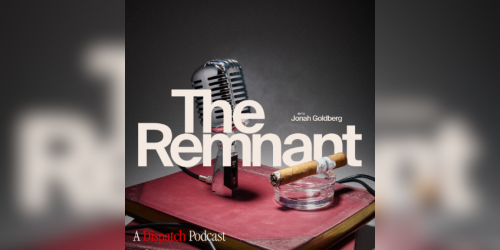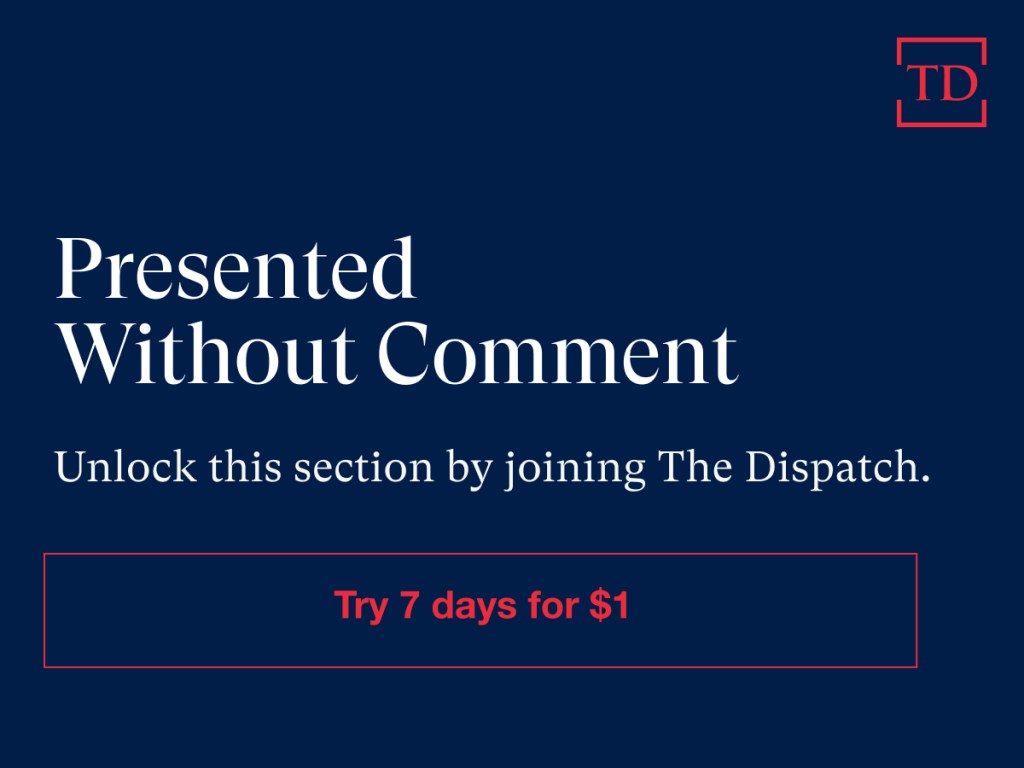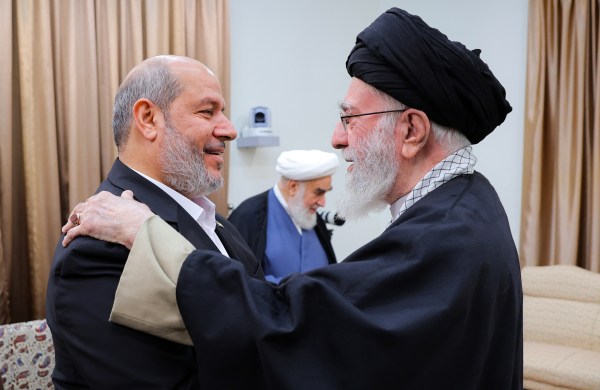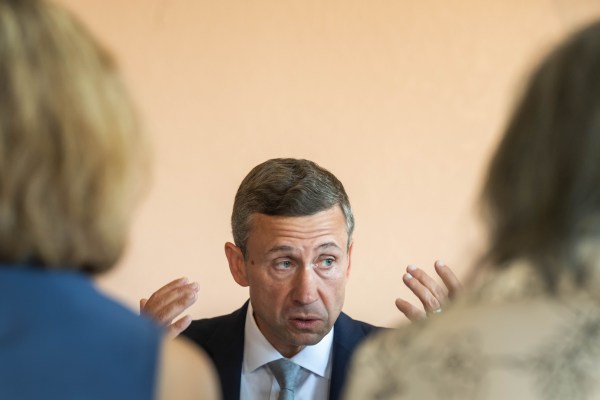Looking to get the most from your Dispatch experience? By filling out a few key details about yourself, you can help us ensure we’re delivering exactly the kind of content you want to read. We’re all about prioritizing your time and interests—fill out this quick survey to get started.
Happy Wednesday! We were digging into TMD’s analytics and wanted to shout out our most underserved readers. Namely, hello to our readers in French Guiana! It’s going to be a sunny day today in Cayenne, with highs of 93 degrees, and perhaps some light showers around lunchtime. Also, if you are one of our Brunei-based readers and have a connection to your country’s royal family, reach out to editor Ross Anderson for a story he’d like to run.
Quick Hits: Today’s Top Stories
- Following White House talks with Ukrainian President Volodymyr Zelensky on Monday, U.S. President Donald Trump said Tuesday that the U.S. will not send troops to Ukraine as part of any peace deal, but may provide support “by air” to European peacekeepers. Trump also conceded, following Friday’s summit in Alaska, that it was “possible” Russian President Vladimir Putin is not interested in a peace deal. Russian forces attacked Ukraine overnight Tuesday with 270 drones and an unspecified number of missiles, according to Ukrainian officials, targeting energy and transport infrastructure in central Ukraine.
- U.S. Director of National Intelligence Tulsi Gabbard revoked the security clearances of 37 national security officials Tuesday, including those who had been members of former President Joe Biden’s National Security Council and individuals who assessed Russia’s attempts to influence the 2016 election. “Those in the Intelligence Community who betray their oath to the Constitution and put their own interests ahead of the interests of the American people have broken the sacred trust they promised to uphold,” Gabbard wrote in a social media post announcing the decision. The internal memo ordering the revocations cited “politicization” of intelligence, failure to adhere to agency standards, and failure to safeguard classified information as the cause, without citing specific evidence.
- Gabbard also announced on X on Monday that the British government has backed down from its demand for Apple to provide a “back door” to encrypted user data, which had been a major sticking point for the administration as it finalizes a new U.S.-U.K. trade deal. In January, the British government ordered Apple to disable its highest level of encryption for data stored in the cloud, a move the company resisted as part of its commitment to user privacy.
- White House press secretary Karoline Leavitt confirmed reports yesterday that the government is interested in taking a 10 percent stake in struggling chip manufacturer Intel, which Trump has aggressively criticized for its CEO’s reported financial ties to Chinese companies. Commerce Secretary Howard Lutnick told CNBC on Tuesday that the company could exchange government grants provided to it under the CHIPS and Science Act for non-voting shares: “We’re just converting what was a grant under Biden into equity for the Trump administration, for the American people.” Intel has struggled in recent years, failing to capitalize on the AI gold rush, but the government’s move comes at a moment of renewed interest in Intel, with Japanese investment giant SoftBank announcing on Tuesday that it would purchase a $2 billion stake in the company. Intel’s share price shot up by almost 7 percent on Tuesday.
- British 30-year bond yields reached their highest levels since 1998 on Tuesday, at one point hitting 5.61 percent as a sell-off shook the U.K. bond market. The rise in borrowing costs threatens to erase the fiscal “headroom” created by Chancellor of the Exchequer Rachel Reeves’ new government spending rules, and is a sign investors are becoming increasingly concerned about Britain’s long-term debt and economic growth prospects. A Western country with alarming levels of government debt? Who could imagine such a thing!
- The American Academy of Pediatrics issued its fall vaccine recommendations Tuesday, which diverge substantially from the guidance issued by the U.S. government. The group recommended all children ages 6 to 23 months receive the COVID-19 vaccine, whereas the Department of Health and Human Services, under Secretary Robert F. Kennedy Jr., does not recommend the vaccine for healthy children. Children in that age range “are at the highest risk for severe COVID-19,” said the AAP in its report. In a statement, HHS spokesman Andrew Nixon said “the AAP is undermining national immunization policymaking with baseless political attacks.” To read more about the government’s shifting vaccine policy, read Tuesday’s TMD.
A message from GlobalPost
Another Ceasefire Attempt

Almost two years after October 7, 2023—when Hamas terrorists murdered 859 civilians, including 38 children, and 274 Israel Defense Forces (IDF) troops, and took 251 hostages—some of the surviving captives may soon be returning home.
Following meetings last week in Cairo between Egyptian and Qatari mediators and Khalil al-Hayya, the leader of Hamas’ political bureau, on Sunday the mediators reportedly extended a ceasefire proposal to Hamas. On Monday, Hamas officials informed news outlets they would agree to the proposed deal.
As a non-paying reader, you are receiving a truncated version of The Morning Dispatch. You can read our full item in the members-only version of TMD.
Details of the deal have not been made public, but Qatari Foreign Ministry spokesman Majed al-Ansari said it is “98 percent” of the ceasefire deal proposed by President Donald Trump’s envoy, Steve Witkoff, in May—fighting between Hamas terrorists and the IDF would be paused for 60 days and a major hostage-for-prisoner swap would proceed. This proposal reportedly stipulates that Hamas would release 10 living Israeli hostages—or half of those who are believed still to be alive—in addition to the bodies of 18 hostages who have died. In return, Israel would release 200 Palestinian prisoners serving sentences of at least 15 years, including 140 serving life sentences. According to BBC reporting, this would also require the release of 1,500 detainees in Gaza, and a “senior Hamas official” told CNN that every Palestinian woman and minor currently imprisoned in Israel would also be freed.
Publicly, the Israeli government has been dismissive of the deal. Prime Minister Benjamin Netanyahu has only obliquely referred to it, saying Hamas is operating under “immense pressure.” A representative for his office told Israeli journalists in a briefing that the government’s policy remains unchanged: It demands “the release of all 50 hostages in accordance with the principles set by the cabinet to end the war.” But Netanyahu’s government hasn’t explicitly rejected the deal, and both Times of Israel and Jerusalem Post reported the government is considering it. This comes at a time when the Israeli government tries to balance internal pressure from nationalists demanding no compromise with Hamas and to proceed with the planned IDF military takeover of Gaza City—which Israel’s Security Cabinet approved on August 8—and wider pressure from the Israeli public to end the war and bring the hostages home.
Egyptian and Qatari mediators had been in talks for months regarding a potential ceasefire deal, but Hamas repeatedly made clear the terms on the table were unacceptable. Last month, Trump expressed skepticism that a ceasefire was on the horizon, stating Hamas negotiators “didn’t really want to make a deal.” But it seems at least for now Hamas has changed its approach.
“What Hamas is afraid of, I think, is the Israeli takeover of Gaza City and they want to prevent it,” Elliott Abrams, a senior fellow for Middle East studies at the Council on Foreign Relations and who served in the three presidential administrations, told TMD.
John Hannah, a senior fellow at the Jewish Institute for National Security of America and former national security adviser for Vice President Dick Cheney, reiterated this point. “This new offensive has injected a real degree of urgency in all the mediators: the Egyptians, the Qataris, even the Turks,” and Hamas itself, Hannah explained to TMD. “Military pressure does work on these guys.”
Hamas has made it known that it’s using Israeli hostages as leverage. Just earlier this month, Hamas circulated a video of Israeli hostage Evyatar David—who was kidnapped at the Nova music festival—in which David is visibly malnourished in a nondescript underground tunnel, digging what he said could be his own grave. “Hamas’ goal, of course, is going to be able to live to fight another day,” Michael Singh, the managing director and senior fellow at the Washington Institute for Near East Policy, told TMD. “It’s an organization dedicated to destroying Israel. They’re not going to give up on that, and their choice to release or keep hostages will probably be based on what they feel best kind of preserves their ability to fight another day.”
Yet, for Hamas, it might be too late. The IDF is reportedly set to issue call-up orders today for 60,000 reserve soldiers and—while not all will ultimately deploy to Gaza City— those assigned to the operation could be ready to do so within two weeks.
That doesn’t necessarily indicate Israel plans to turn down the ceasefire, but since the October 7 attacks Netanyahu’s government has had two goals: Free the hostages and end Hamas rule in Gaza. “It’s a classic Hobson’s choice, right?” Singh said. “If you say no to a ceasefire deal, there’s a real risk you’re consigning those hostages to die inside Gaza in captivity. If you accept a partial ceasefire deal and leave Hamas in place, you’re really just setting the conditions for the next war.” Already, some ultranationalist Israeli officials have pushed Netanyahu to turn his back on a deal that spares Hamas from destruction.
“You have no mandate to go for a partial deal,” National Security Minister Itamar Ben-Gvir said in a statement addressed to the prime minister. “The blood of our soldiers is not worthless. We must go all the way. Destroy Hamas.” Finance Minister Bezalel Smotrich echoed the point, writing on X that Hamas is only open to negotiation because of the Gaza plan: “It understands that this will eliminate it and end the story. Therefore, it is trying to stop it by bringing back the partial deal. This is exactly why we can’t surrender and grant the enemy a lifeline.”
But Netanyahu is also under pressure from much of the Israeli public, who want to see more effort and success in securing the release of the remaining hostages. Protests erupted across the country on Sunday, with an estimated 500,000 demonstrators taking to the streets in Tel Aviv, rallying against the war’s continuation and calling for an immediate hostage release deal. The looming decision for Netanyahu is an “enormously complicated calculation,” Hannah said. “You’ve got a country that’s been at war now for 23 months that is very tired. A significant part of the population wants to just get the hostages back and end the war.”
There are also international relations to consider. Concern over the humanitarian situation in Gaza and the lack of critical resources accessible to Palestinian civilians pushed several nations—including Australia, Canada, France, and the U.K.—to officially recognize Palestinian statehood in recent weeks. Though Israel said last week that it’s allowing more trucks carrying humanitarian aid to enter Gaza, the United Nations Office for the Coordination of Humanitarian Affairs stated that, in July, more than 13,000 Gazan children were admitted to treatment centers for acute malnutrition, while 2,800 were diagnosed with severe acute malnutrition. To read more on the difficulties bringing humanitarian relief into Gaza, read July 24’s TMD.
However, even if both sides are motivated to make a ceasefire deal, it’s the details that could derail it. Negotiators and Hamas representatives are sharing the “98 percent” number to indicate just how close this is to a previous U.S.-sanctioned ceasefire, but Hamas could slip a lot of negotiation non-starters into that remaining 2 percent. The terror group has seemingly dropped most of the demands that led to the collapse of ceasefire talks in July but those that remain may be unsurpassable; and rather than a genuine effort to make a deal, this may be little more than a Hail Mary to delay the operation in Gaza City.
“We have heard Hamas say many times that it is accepting this or that ceasefire proposal only for the discussions to get then really bogged down over what they sound like insignificant details, but actually end up being major issues,” Singh said. These sticking points can include the process for which humanitarian aid is distributed within Gaza, as well as “the exact sort of wording or mechanism for whether the cease fire gets extended.”
Similarly, Hannah noted both sides must not only agree on the number of hostages and prisoners to be exchanged, but also on which hostages and prisoners to exchange. “There’s always those questions about exactly which Palestinian killers and murderers are going to get out,” he said. “Hamas had upped the ante by saying any release of Palestinian prisoners” had to include perpetrators of the October 7, 2023, attacks. “And that obviously was impossible for Israel.”
“Nothing is done until it’s done,” Jonathan Schanzer, the executive director at the Foundation for Defense of Democracies and a former Treasury Department official who froze Hamas funding schemes, told TMD. “There have been multiple moments throughout this conflict where deals appear to have been agreed upon and then are scuttled. So, I don’t believe anything right now until I actually see something signed and implemented.”
While many of the hostages kidnapped on October 7 have been freed in previous hostage exchanges, as many as 41 so far may have died in Gaza.
Today’s Must-Read
Following the return this week of Democratic lawmakers who fled the state to deny the legislature a quorum, the Texas House of Representatives began its work in the second special session to pass a congressional district map that’s poised to add five Republican seats to the U.S. House. Texas’ actions appear to be the opening salvo in nationwide redistricting wars. As Republicans claim that they are seeking to amend an already flawed distribution of favorable congressional districts, Democrats insist that a reaction on their part would be to undo unfair partisan redistricting by the GOP. Both parties have been guilty of gerrymandering, but determining which party does it more—and how much of an advantage it gives their candidates on Election Day—can be difficult, with different metrics producing different results.
Toeing the Company Line
Leading From Behind
At the top, support for Israel falters.
Can MAGA Make Use of Mamdani?
Some Republicans are eager to make the radical progressive the face of the Democratic Party.
Failed Bromance
Trump’s overtures to Putin have gained us nothing and cost the Ukrainians dearly.
What a Difference a Few Days Make
Monday’s White House meeting between Trump and European leaders offers some hope for Ukraine.
Pleading Insanity | Interview: Emmett Rensin
Muddling through the problem.
Worth Your Time
Vice President J.D. Vance has not been shy about criticizing censorship in Europe, including during his speech at the Munich Security Conference when he accused the continent of back-tracking on freedom of speech. Conor Friedersdorf argues in The Atlantic that the vice president isn’t wrong: “Germany has a unique history that informs its speech restrictions, which are motivated in part by a desire to prevent anything like the Holocaust from happening again. But Iris Hefets, an Israeli-born activist, believed that she was trying to stop a human-rights atrocity when she was arrested at a protest in Berlin for holding a sign that said As a Jew and Israeli, stop the genocide in Gaza. Although she was not criminally charged in that incident, she has been arrested on two other occasions for nonviolent pro-Palestinian protests. A German court convicted another activist for leading a ‘From the river to the sea, Palestine will be free’ chant in Berlin.” Friedersdorf continues: “Jacob Mchangama, an academic who researches freedom of expression in Europe, reported earlier this year that German police investigations of online speech ‘happen to literally thousands of people,’ including climate activists, pro-Palestinian activists, and ordinary people. ‘Even posting a book cover on X that features a barely visible swastika on a facemask—intended to draw sarcastic parallels between COVID policies and Nazi-era policies—can lead to a criminal conviction for displaying prohibited symbols,’ he wrote.”
Presented Without Comment
The Mirror: MP Spotted Using ChatGPT to Respond to Constituents on the Train
Also Presented Without Comment
Reuters: Wooden Church Sets Off on Slow Swedish Road Trip to Escape Mining Subsidence
Also Also Presented Without Comment
ABC: FDA Warns Public Not to Eat Possibly Radioactive Shrimp Sold at Walmart
Let Us Know
Have any thoughts or questions about today’s newsletter? Drop us a note in the comments!
















Please note that we at The Dispatch hold ourselves, our work, and our commenters to a higher standard than other places on the internet. We welcome comments that foster genuine debate or discussion—including comments critical of us or our work—but responses that include ad hominem attacks on fellow Dispatch members or are intended to stoke fear and anger may be moderated.
With your membership, you only have the ability to comment on The Morning Dispatch articles. Consider upgrading to join the conversation everywhere.